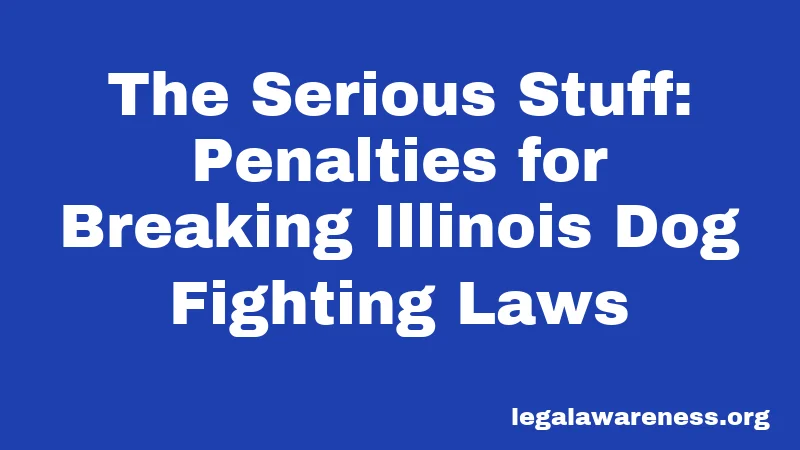Dog Fighting Laws in Illinois (2026): The Complete Penalty Guide
Most people have no idea just how serious Illinois takes dog fighting. Honestly, the state laws are some of the toughest in the nation. If you’re thinking this is just about the fights themselves, think again. Illinois treats this crime like organized crime—and the penalties hit hard.
This guide breaks down everything you need to know about dog fighting laws in Illinois. We’re talking what’s illegal, how serious the consequences are, and what happens if you get caught. Stay with me here, because this stuff matters.
What Is Dog Fighting?

Dog fighting isn’t just about dogs attacking each other. It’s a criminal operation. Dog fighting involves breeding dogs specifically for fighting, training them to fight, or forcing them to battle each other for entertainment, money, or gambling.
Here’s the important part: it doesn’t matter if you personally bred the dog, trained it, or just showed up to watch. Illinois makes almost every single part of this illegal. Even owning a dog you know is going to be used for fighting is a crime. Yep, that’s all you need to know to realize how serious this is.
The Basics: What’s Actually Illegal
Owning or Breeding Dogs for Fighting
You cannot own, breed, train, or even lease any dog that you know is meant for fighting. This is the core of the law. If you knowingly have a dog intended for a fight, you’re breaking the law.
You can’t capture a dog for fighting either. You can’t sell or trade dogs you know will be used this way. Not sure if this applies to you? Ask yourself: is there any chance someone might use this dog to fight? If the answer is yes, you’re in violation.
Pretty straightforward, right?
Promoting or Conducting Fights
No person can promote, conduct, or advertise a dog fight. You can’t collect money for it. You can’t help organize it in any way. Think of it like being the organizer of an illegal sports event, except the athletes are animals and the whole thing is considered criminal enterprise.
This covers everything: the people who set up the fights, the people who book the location, and the people who take bets. All of it is illegal.
Selling Dogs Bred for Fighting
You cannot sell, ship, transport, or deliver any dog that was bred, trained, or will be used for fighting. Even offering to sell such a dog is a crime. This applies whether you’re selling locally or across state lines.
Providing Equipment or Facilities
Wait, it gets more serious. You can’t manufacture equipment meant for dog fights. You can’t own, possess, or sell such equipment. Equipment includes things like treadmills designed for training, restraints, or any device made specifically for fighting purposes.
You also can’t let someone use your property for a dog fight. If you knowingly allow your land, building, or facility to be used for fighting, you’ve broken the law.
Wondering what counts as fighting equipment? Basically, anything designed or used to prepare dogs for fighting. When in doubt, if it seems like it could be used for that purpose, it’s illegal.
The Serious Stuff: Penalties for Breaking Illinois Dog Fighting Laws

Prison Time and Fines for Breeding and Training
If you breed, train, own, or lease a dog for fighting, you’re facing serious felony charges. Here’s what happens:
First offense? Class 4 felony. You could face up to 3 years in prison. You might also be fined up to $50,000.
Second offense or more? Class 3 felony. Now you’re looking at 2 to 5 years in prison. The fines jump to up to $50,000 again.
These aren’t small penalties. We’re talking real prison time.
Penalties for Attending Fights
Okay, pause. Read this carefully. Just showing up to watch is a crime too.
For a first offense of knowingly attending a dog fight, you get charged with a Class 4 felony. That means up to 3 years in prison.
If you get caught again? Class 3 felony. You’re now facing 2 to 5 years in prison.
Still think it’s just about being there? It’s not. The law treats attendance the same as participation.
Equipment and Facility Penalties
Manufacturing or selling fighting equipment? Class 4 felony for a first offense. Class 3 felony for a second offense.
If you provide a location for dog fights, you face a Class 4 felony. But here’s where it gets worse. If that location is within 1,000 feet of a school, playground, park, or child care center, your penalties jump way up. A first offense becomes a Class 3 felony. A second offense? Class 2 felony, which carries 3 to 7 years in prison.
Honestly, this is the part most people miss. Location matters big time.
Penalties for Involving Minors
This one’s probably the most important rule. You cannot solicit a minor to participate in or attend dog fighting. If you try to get someone under 18 involved, you face a Class 4 felony.
But it gets tougher. If a child under 13 is present at a dog fight, the adult who brought them there gets charged with a Class 3 felony for a first offense. Second offense? Class 2 felony. Those are serious prison sentences.
When Penalties Get Even Worse
Illinois has extra-tough laws for certain situations. Here’s where things escalate:
If a dog participates in a fight AND any of these are true, the offense jumps to a Class 3 felony:
- A person under 18 years old is present at the fight
- The fight involves illegal wagering (betting)
- The fight is connected to street gang activity
So if you’re running fights as part of gang activity, that’s worse. If you’re gambling on the fights, that’s worse. If kids are watching, that’s definitely worse. This law adds serious extra penalties.
Asset Forfeiture: You Can Lose Everything

Here’s something people don’t always realize. Getting convicted isn’t just about prison and fines.
Any dog involved in a fighting case gets seized immediately. You lose that animal. The state takes it.
But it goes beyond that. Any equipment, vehicles, or property used in the violation can be seized and sold at public auction. The money from that sale goes to the county. Basically, the government can take your stuff.
Think of it this way. You don’t just face time behind bars. You could lose your car, your equipment, your animals, and anything else connected to the crime.
Special Circumstances and Aggravating Factors
Gang-Related Fighting
Illinois has gang laws that make dog fighting even worse if it’s connected to street gang activity. If the dogfight is performed to further gang operations, expect harsher penalties and possible additional charges under gang statutes.
Fighting With Wagering
When money’s involved—when people are betting on fights—that’s a separate legal aggravation. Illegal wagering is a criminal activity on its own, and it adds serious charges on top of fighting violations.
Veterinarian Reporting Requirements
Here’s something many people don’t know. If a veterinarian treats a dog with injuries from fighting, they’re required to report it to the Illinois Department of Agriculture. They must provide the owner’s name, dates, and dog descriptions.
Don’t worry about privacy concerns though. Veterinarians who report in good faith are protected from legal liability. They can’t be sued for making the report.
What About Dogs That Are “Victimized” in Fights?
Any dog seized because of a fighting case gets protection. The state impounds these animals immediately. They can’t be returned to owners.
Many of these dogs go to rescue organizations or sanctuaries. Some receive rehabilitation to help them recover from trauma. Illinois takes animal welfare seriously in these cases.
If you encounter a dog that seems to have been trained for fighting, contact your local animal control. They’ll handle the situation properly.
How to Report Dog Fighting
Contacting Local Authorities
If you suspect dog fighting is happening in your area, contact your local police department or animal control. In Chicago and other major cities, you can call the specific animal control hotline.
You can report anonymously in most cases. You don’t need to give your name. Just provide details about where you suspect the activity is happening and what you’ve observed.
What Information to Provide
Give authorities specific details: a location, a date and time if you know it, descriptions of people involved, and any vehicle information. The more details you can provide safely, the better.
Don’t try to investigate yourself. Don’t go to the location. Just report it and let law enforcement handle it.
Statewide Resources
The Illinois Department of Agriculture handles animal cruelty complaints. You can file a report with them online or by phone. The American Society for the Prevention of Cruelty to Animals (ASPCA) also accepts tips about fighting operations.
Many cities have local animal welfare organizations. These groups can point you toward the right agency to contact.
How These Laws Actually Work in Practice
Evidence and Proof
Police don’t need to catch dogs actually fighting to make an arrest. If they find someone with fighting equipment AND a dog, that’s enough evidence of intent. Just possessing the right combination of items can prove someone’s planning to fight dogs.
Veterinarians reporting injuries are often key evidence. Text messages about fights, social media posts, and witness testimony all count.
Penalties Can Stack
Here’s something important: courts can add multiple charges. If you breed dogs, train them, and attend fights, you face separate charges for each violation. They add up fast.
Criminal History Matters
If you have prior convictions for animal cruelty or fighting, penalties go up. Some judges might impose longer sentences or higher fines based on your history.
Animal Protection After Conviction
Let me break this down for you. If you’re convicted of dog fighting, the court has power to do more than just imprison you.
The judge can order you to give up any dogs you own. They can ban you from having ANY animals for a period they decide. This ban can also apply to people in your household if they knew about the fighting or helped you.
This is a powerful tool. It prevents someone convicted from just getting new dogs and starting over.
Frequently Asked Questions
Is dog fighting a felony in Illinois? Yes, absolutely. Almost all dog fighting offenses are felonies. Even attending a fight is a Class 4 felony for a first offense. This isn’t a misdemeanor situation.
What’s the maximum prison sentence for dog fighting in Illinois? For the most serious offenses (Class 2 felonies), you face up to 7 years in prison. For Class 3 felonies, it’s 2 to 5 years. These are serious sentences.
Can I lose my house if I’m convicted of dog fighting? Your house itself probably won’t be forfeited unless the fighting happened there and it was used specifically as a fighting facility. But vehicles, equipment, and property directly related to the fighting can be seized and sold.
What happens to dogs seized in a fighting case? They’re impounded by the state. Some receive rehabilitation and go to rescue organizations. The original owner loses all rights to them. The state decides what happens to the animals.
Do I have to report dog fighting if I see it? The law doesn’t require regular citizens to report it. However, veterinarians must report if they treat injured dogs. If you see something, reporting helps animals and communities. It’s always the right call, even if it’s not legally required.
What if I didn’t know the dog was for fighting? “I didn’t know” is usually not a legal defense. The law uses the word “knowingly,” but courts interpret this broadly. If you should have known, you might still be guilty. Claim ignorance at your own risk.
Can minors be charged with dog fighting crimes? Yes. Young people can face these same charges. They might be tried as juveniles, which could mean different proceedings and sentences, but they can still face serious consequences.
Does Illinois have a registry for people convicted of animal fighting? Illinois doesn’t have a specific fighting registry, but animal cruelty convictions become part of your criminal record. That record is public and can affect employment, housing, and other things.
Final Thoughts
Illinois doesn’t mess around with animal cruelty or dog fighting. The state ranks among the best in the nation for animal protection laws. That means serious penalties for serious crimes.
Whether it’s breeding, training, attending, or providing equipment, dog fighting is a felony. You could face years in prison. You could lose money, property, and animals. A conviction follows you for life.
If you know about dog fighting happening in Illinois, report it. If you’re thinking about getting involved, don’t. The consequences are real, and they’re severe.
Stay informed, stay safe, and when in doubt, ask a lawyer or contact local authorities. Now you know the basics. Use this knowledge wisely.
References
- Illinois Statutes Chapter 720, Section 5/48-1 – Dog Fighting Law
- Animal Legal & Historical Center – Illinois Animal Cruelty Laws
- Illinois Department of Agriculture – Animal Welfare
- Animal Cruelty Laws in Illinois – Lawyers.com
- Animal Legal Defense Fund – Illinois Animal Protection Rankings
- American Society for the Prevention of Cruelty to Animals (ASPCA)
